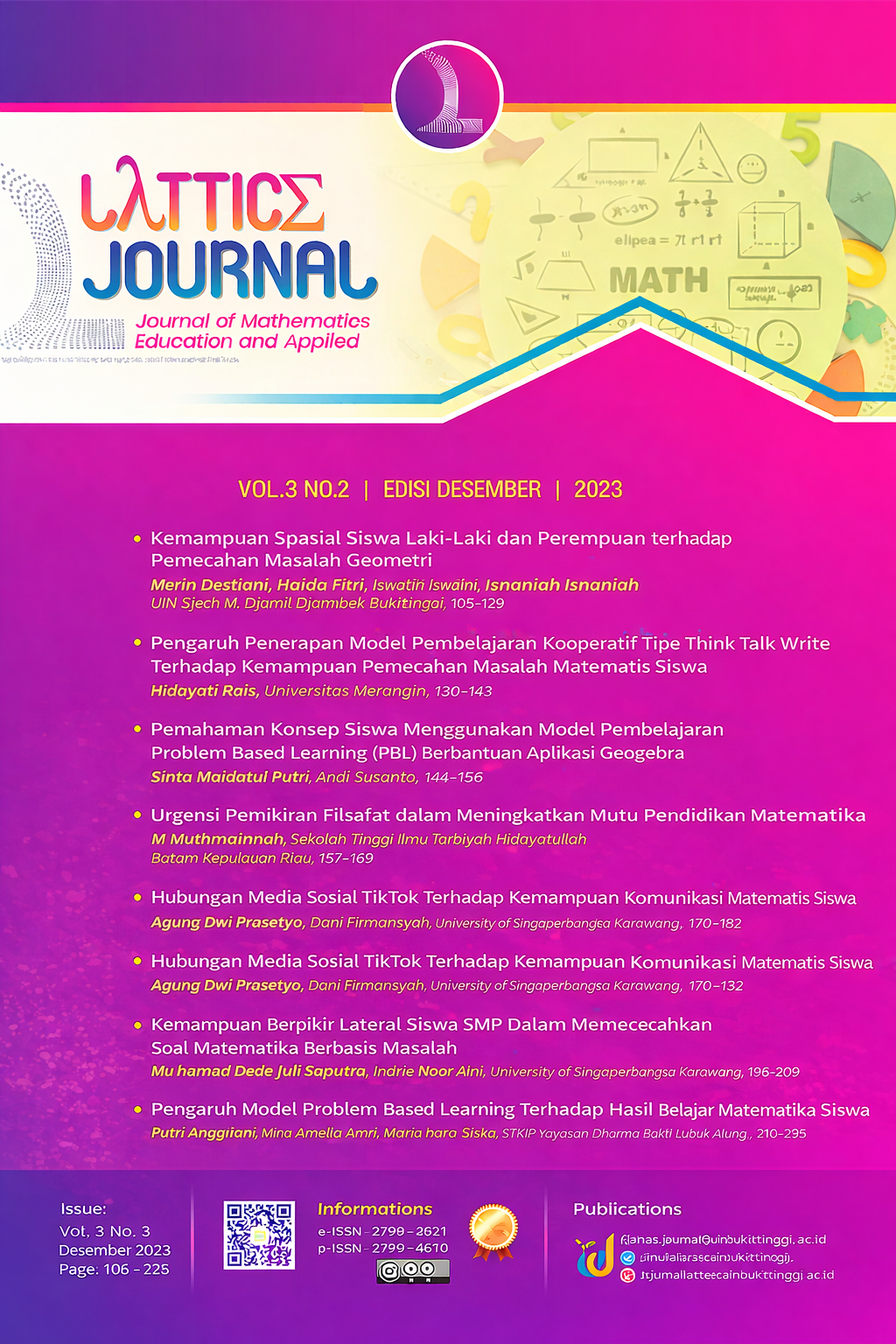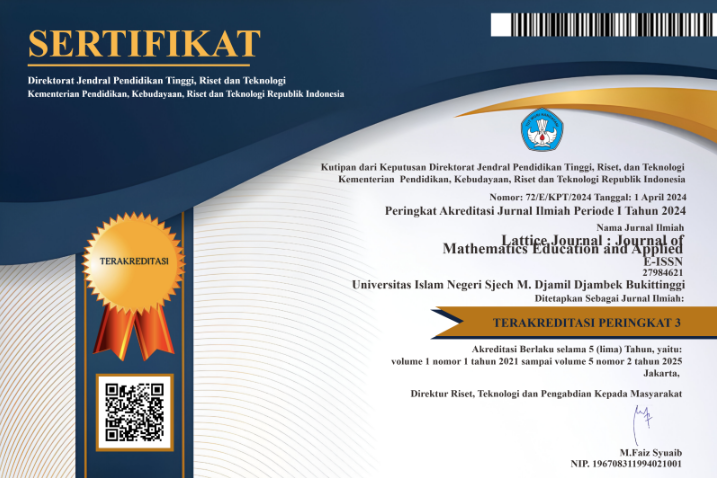Pengaruh Penerapan Model Pembelajaran Kooperatif Tipe Think Talk Write Terhadap Kemampuan Pemecahan Masalah Matematis Siswa
DOI:
https://doi.org/10.30983/lattice.v3i2.7584Keywords:
Think Talk Write, Kemampuan Pemecahan Masalah MatematisAbstract
Tujuan dari riset ini ialah untuk mendeskripsikan kemampuan pemecahan masalah matematis memakai model pembelajaran kooperatif tipe think talk write lebih baik daripada memakai pembelajaran konvensional siswa kelas XI Program IPA SMA N I Pelepat Ilir Tahun Pelajaran 2022/2023. Riset ini memakai pendekatan kuantitatif, metode eksperimen memakai riset posstest only control design. Populasi dalam riset ini ialah siswa kelas XI Program IPA SMA N I Pelepat Ilir terdiri dari lima kelas. Teknik penarikan sampel memakai Simple Random Sampling, terpilih siswa kelas XI IPA I sebagai kelas eksperimen dan kelas XI IPA II sebagai kelas kontrol. Teknik pengumpulan data melalui tes kemampuan pemecahan masalah matematis berbentuk soal essay berjumlah 7 buah soal pada pokok bahasan limit fungsi aljabar. Analisis data yang dipakai untuk menguji hipotesis ialah uji-t (Independent Sample t-test). Dari analisis data tes akhir kelas eksperimen diperoleh mean 34,27, varians 26,280, sedangkan kelas kontrol diperoleh rata-rata 27,56, varians 71,544. Hasil uji hipotesis didapat, thitung = 3,824 dan ttabel = 1,671 atau thitung > ttabel  maka H1 diterima. Kesimpulan riset ini ialah kemampuan pemecahan masalah matematis menggunakan model pembelajaran kooperatif tipe think talk write lebih baik daripada pembelajaran konvensional siswa kelas XI Program IPA SMA N I Pelepat Ilir.
References
L. K. Asmoro and H. Syarifuddin, “Pengaruh Penerapan Model Pembelajaran Kooperatif Tipe Think Talk Write (TTW) terhadap Kemampuan Pemecahan Masalah Matematis Peserta Didik Kelas XI SMA Negeri 2 Tebo,†vol. 10, no. 2, pp. 84–89, 2021.
H. Ramdayani, F. Nur, and R. Nuraeni, “Perbedaan Peningkatan Kemampuan Pemecahan Masalah Matematis Siswa antara Think Pair Share dan Think Talk Write Mosharafa : Jurnal Pendidikan Matematika Mosharafa : Jurnal Pendidikan Matematika,†vol. 9, 2020.
A. Fauzan, Kemampuan Matematika. UN.Padang, 2012.
A. Sudijono, Pengantar Evaluasi Pendidikan. PT Raja Grafindo Persada. Jakarta, 2012.
N. S. Putri, D. Juandi, and A. Jupri, “Pengaruh Model Pembelajaran Kooperatif Tipe Think-Talk-Write terhadap Kemampuan Komunikasi Matematis Siswa : Studi Meta-Analisis,†vol. 06, no. 01, pp. 771–785, 2022.
L. Sani, “Pengaruh Penerapan Model Pembelajaran Think Talk Write Terhadap Kemampuan Berpikir Kritis Matematis Siswa SMP,†J. Al-Ta’dib, vol. 11, no. 2, pp. 1–18, 2018.
M. Wati, G. H. Medika, and J. Junaidi, “Pengaruh Kemampuan Koneksi Matematis Terhadap Kemampuan Pemecahan Masalah Matematis Siswa,†Math Educ. J., vol. 5, no. 1, pp. 54–61, 2021, [Online]. Available: https://ejournal.uinib.ac.id/jurnal/index.php/matheduca/article/view/1823
A. Malini, N. Hikmah, W. Wahidaturrahmi, and L. Hayati, “Pengaruh model pembelajaran kooperatif tipe think talk write (TTW) terhadap kemampuan pemecahan masalah matematika siswa kelas XI MIA SMA NW Mataram Tahun Pelajaran 2019/2020,†Griya J. Math. Educ. Appl., vol. 1, no. 4, pp. 711–719, 2021, doi: 10.29303/griya.v1i4.109.
Sugiyono, Metode Penelitian Kuantitatif. Yogyakarta: Alfabeta, 2017.
A. Irianto, Statistik: Konsep Dasar, Aplikasi dan Pengembangannya. Jakarta: Kencana, 2016.
S. Arikunto, Prosedur Penelitian Suatu Pendekatan Praktik. Jakarta: PT Rineka Cipta, 2016.
Prawironegoro, Evaluasi Hasil Belajar Khusus Analisis Soal Untuk Bidang Studi Matematika. BPL. Jakarta, 1985.
Riduwan, Belajar Mudah Penelitian Untuk Guru - Karyawan dan Peneliti Pemula. Alfabeta. Bandung, 2011.
L. A. Rija and K. Kusnandi, “Think Talk Write Model untuk Kemampuan Pemecahan Masalah Matematika Siswa,†JIIP - J. Ilm. Ilmu Pendidik., vol. 6, no. 4, pp. 2655–2660, 2023, doi: 10.54371/jiip.v6i4.1906.
Zulfianingrat.M., Soeprianto.H.,dan Prayitno.S., “Pengaruh Model Pembelajaran Kooperatif Tipe Think Talk Write Terhadap Kemampuan Pemecahan Masalah Matematika,†vol. 3, no. 1, pp. 6–13, 2021.
R. Wahid, Busnawir, and L. Sahidin, “Pengaruh Model Pembelajaran Kooperatif Tipe Think Talk Write Terhadap Kemampuan Pemecahan Masalah Matematis Siswa,†J. Amal Pendidik., vol. 3, no. 2, pp. 223–233, 2022.
E. Lestari, Syahrilfuddin, and Z. Antosa, “Pengaruh Model Pembelajaran Kooperatif Tipe Think Talk Write (Ttw) Terhadap Kemampuan Pemecahan Masalah Matematika Siswa Kelas V Sd Negeri 194 Pekanbaru,†J. Kiprah Pendidik., vol. 1, no. 2, pp. 67–75, 2022, doi: 10.33578/kpd.v1i2.34.
Downloads
Published
How to Cite
Issue
Section
Citation Check
License
Copyright (c) 2023 Hidayati Rais, Ramadhani Ramadhani

This work is licensed under a Creative Commons Attribution-ShareAlike 4.0 International License.
Authors who publish with Lattice Journal : Journal of Mathematics Education and Applied agree to the following terms: Authors retain copyright and grant the Lattice Journal : Journal of Mathematics Education and Applied right of first publication with the work simultaneously licensed under a Creative Commons Attribution License (CC BY-SA 4.0) that allows others to share (copy and redistribute the material in any medium or format) and adapt (remix, transform, and build upon the material) the work for any purpose, even commercially with an acknowledgement of the work's authorship and initial publication in Lattice Journal : Journal of Mathematics Education and Applied. Authors are able to enter into separate, additional contractual arrangements for the non-exclusive distribution of the journal's published version of the work (e.g., post it to an institutional repository or publish it in a book), with an acknowledgement of its initial publication in Lattice Journal : Journal of Mathematics Education and Applied. Authors are permitted and encouraged to post their work online (e.g., in institutional repositories or on their website) prior to and during the submission process, as it can lead to productive exchanges, as well as earlier and greater citation of published work (See The Effect of Open Access).



